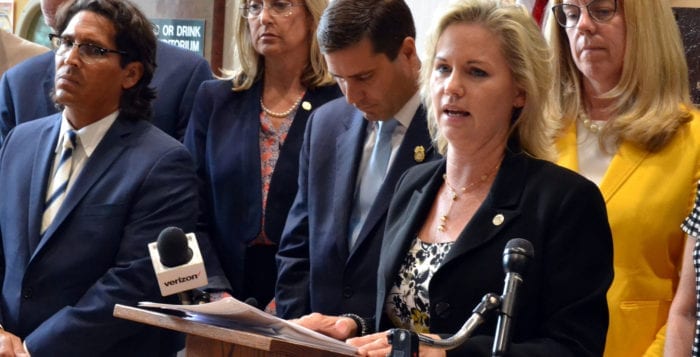By Kyle Barr
Following another year of rising opioid use and overdoses, Suffolk County officials announced legislation that would create a new permanent advisory panel to try to address the issue.
“We have lost people from this [problem],” Suffolk County Legislator Sarah Anker (D-Mount Sinai) said during a July 25 press conference. “Children have died, adults have died and we’re here to do more.”
The panel would have 24 members, including representatives from health and science groups, members of law enforcement, hospital employees and individuals from the Legislature’s Committees on Health, Education and Human Services and would focus on prevention, education, law enforcement and drug rehabilitation across the county, Anker said. The panel is planned to be broken up into sub-committees, which would tackle a specific area.
“This is an issue that needs all hands on deck,” Suffolk County Police Commissioner Tim Sini said. “We are not going to arrest ourselves out of this — this is a public health issue [of historic proportion], but law enforcement plays a critical role.”
Over 300 people from Suffolk County died from opioid-related overdosess in 2016, according to county medical examiner records. Sini said that in 2016, the police administered Narcan, a nasal spray used as emergency treatment to reverse the effects of an opioid overdose, in Suffolk County over 700 times.
A 2010 bill saw the creation of a similar advisory panel with 13 members, many of whom are members of the new proposed panel. The original, impermanent panel ended five years ago, but had made 48 recommendations to the legislature focused mainly on prevention education, treatment and recovery. Two recommendations from this committee that were put in effect were the Ugly Truth videos shown in public schools, and countywide public Narcan training.
Though proud of the work they did on that panel, members agreed the situation has worsened since it was disbanded.
“[Seven] years ago we stood here and announced the initial panel — I had the privilege of co-chairing that group — a lot of the things we recommended actually happened, some things didn’t,” said Dr. Jeffrey Reynolds, chief executive officer of the Family and Children’s Association. “Regardless, the problem hasn’t gotten any better, and in fact, it’s gotten progressively worse. Some of the gaps in prevention, access to treatment, recovery and law enforcement haven’t yet been filled. For us to have an ongoing opportunity to have a dialogue together — to brainstorm some new solution to disrupt the patterns here — is very, very valuable.”
On the education side, Islip School District Superintendent of Schools Susan Schnebel said at the press conference that education has to begin at a very young age.
“It’s important that schools take hold of what happens in the beginning,” she said. “That includes educating students at a very early age, educating the parents to know what’s there, what are the repercussions, what is the law. That needs to happen with a 5 or 6-year-old.”
Executive director of the North Shore Youth Council Janene Gentile, and member of the proposed panel, feels that the advisory panel is an important step. She said she hopes that it will be able to do more in helping prevent people, especially young people, from using opioids in the first place, and hopefully help those exiting rehab.
“Implementing a family component when they are in rehab is really crucial, while they are in rehab and when get out,” Gentile said. “There are other agencies like mine — 28 in Suffolk County. If we can reach out to them they can help with re-entry [into society]. They go on the outside and the triggers that started them on opioids are still there, and they need to have places where there are no drugs. We’ve gone through a lot, but we’ve got to do more — and prevention works.”





